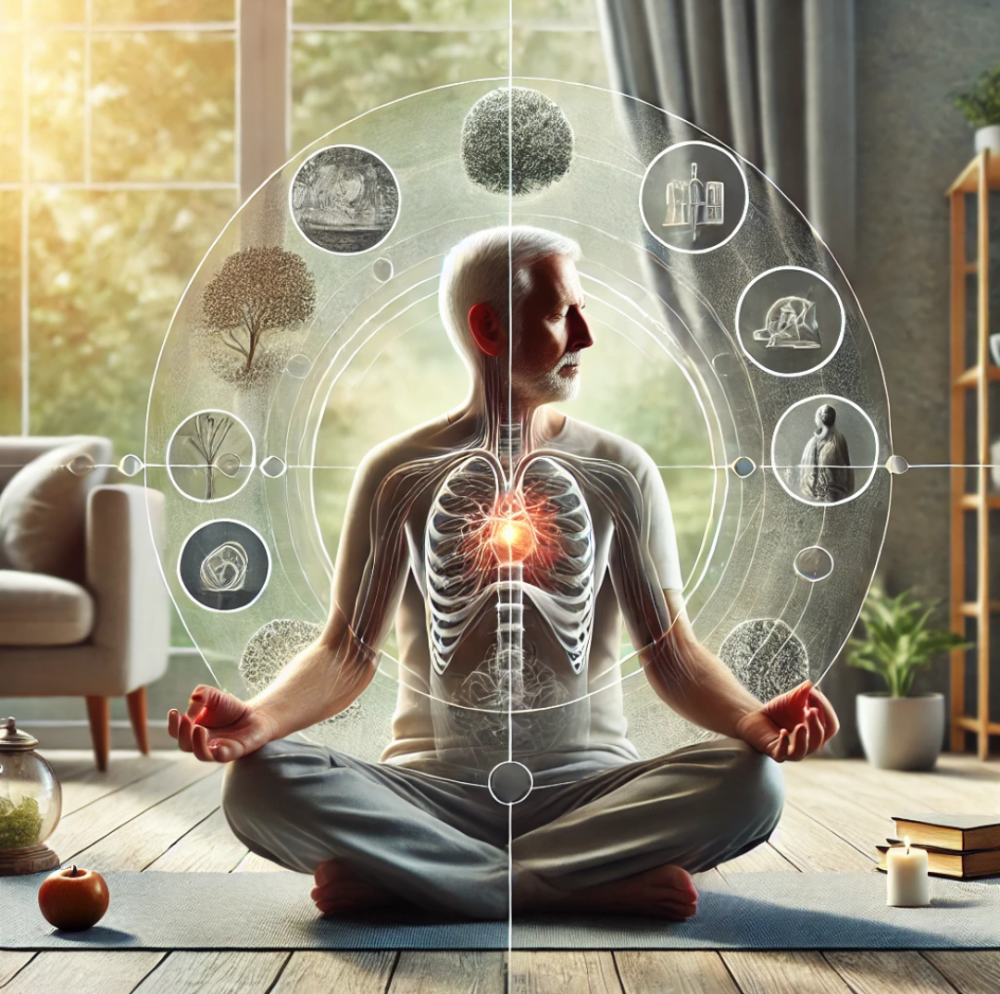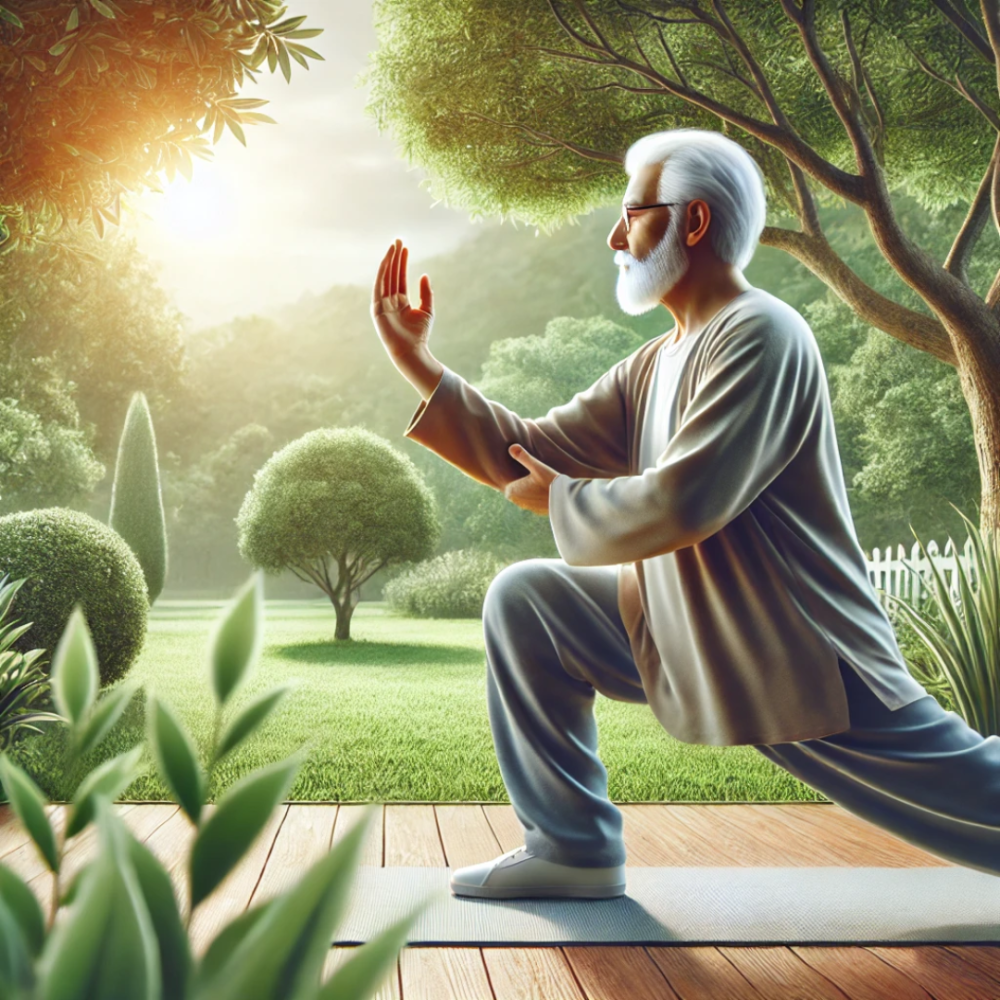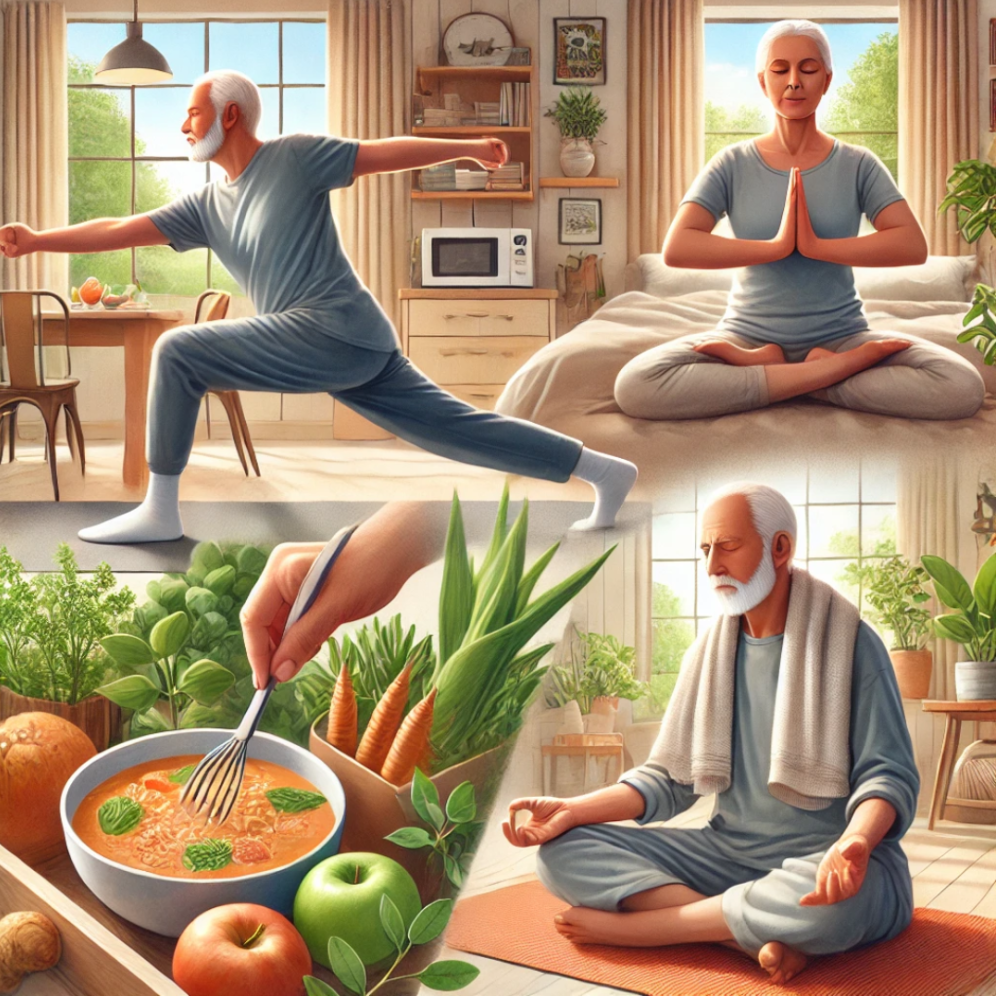Introduction

Holistic mental health is all about treating the whole person—not just the mind but the body and spirit, too. This approach examines how different aspects of a person’s life are interconnected and impact mental well-being. For seniors, this is especially crucial. Aging brings unique challenges, and a holistic perspective can be a game-changer.
Addressing mental health in seniors is vital. It can improve their emotional well-being, physical health, and social connections. Imagine feeling more energetic and connected to those around you. That’s what we want to achieve.
The benefits of a holistic approach are vast. It can help reduce stress, improve memory, boost mood, and enhance overall quality of life. Holistic methods, which consider diet, exercise, mental exercises, and social connections, provide a comprehensive way to improve mental health.
Throughout the article, we’ll explore topics like nutritional strategies, physical activities, and mental well-being practices, all of which aim to boost mental health and memory in seniors. Let’s begin this journey to better mental health and a more prosperous life.

Nutritional Strategies for Enhancing Mental Health and Memory
Fueling your body with the proper nutrients can do wonders for your brain. Think of it as giving your car high-quality gas – it runs smoother, right? A balanced diet is vital to maintaining seniors’ mental sharpness and overall well-being.
Essential nutrients like omega-3 fatty acids, antioxidants, and vitamins B and D are crucial. Omega-3s in fish like salmon and flaxseeds help improve cognitive function. Antioxidants in berries and dark chocolate protect your brain cells from damage. And don’t forget about vitamins B and D; they play a significant role in brain health and mood regulation.
Incorporating foods that boost memory and cognitive functions into your diet is easier than you might think. Blueberries, leafy greens, nuts, and seeds are superstars regarding brain food. These foods are packed with nutrients that keep your brain healthy and your memory sharp. Swap out processed snacks for a handful of nuts or a smoothie with berries for a delicious and brain-boosting treat.
Supplements can also help, especially if your diet isn’t entirely balanced. Omega-3 supplements, vitamin D capsules, and even turmeric pills can be beneficial. But always consult with a healthcare provider before starting any supplement to ensure it’s safe and appropriate for you.
Mindful eating practices can profoundly affect mental health. Eating slowly, savoring your food, and paying attention to hunger and fullness cues can make a big difference. It’s not just about what you eat, but how you eat it. Mindfulness can reduce stress, improve digestion, and enhance the overall eating experience. Plus, it can help seniors develop a healthier relationship with food.

Physical Activities that Support Mental Health
Physical activity isn’t just about keeping your body in shape; it’s also a powerhouse for your brain. For seniors, staying active is like a double win – it enhances physical health and boosts mental well-being.
Exercise brings a wealth of psychological benefits. It pumps up endorphins, the feel-good hormones while reducing stress and anxiety. Imagine feeling more relaxed and happy just from a daily walk around the neighborhood or a gentle workout. It’s that simple.
There are plenty of physical activities suitable for seniors. Walking, swimming, and cycling are excellent low-impact options. These activities are easy on the joints but offer a great cardiovascular workout. And remember, it’s not about intense workouts; consistency is the key.
Yoga and tai chi are particularly beneficial for mental wellness. These practices combine physical movement with mindfulness, helping improve flexibility, balance, and mental clarity. They’re perfect for seniors looking to enhance their body and mind without straining themselves.
Incorporating physical activity into daily routines can be straightforward. Setting small, achievable goals like a 10-minute daily walk or light stretching can make a huge difference. Consider joining a local senior exercise group or taking a dance class. Making it social adds an extra layer of fun and motivation.
By weaving in regular physical activities, seniors can enhance their mental health, boost their mood, and enjoy a more prosperous, more engaged life. It’s about finding what you want and making it a regular part of your day.

Mental and Emotional Well-being Practices
Maintaining mental and emotional health requires more than physical activity and a healthy diet. Techniques like mindfulness and meditation can truly reflect the essence of holistic living. Mindfulness is about staying present in the moment and fully engaging with your current activity or environment. Practicing mindfulness can significantly reduce stress, improve focus, and enhance emotional regulation.
Meditation is closely related and has its benefits. Even 10 minutes a day can improve overall mental well-being. Guided meditations on various apps and online platforms can help seniors develop a regular practice.
But it’s not just about sitting in silence. Staying socially connected is equally important. Regular interactions with friends and family, joining community groups, or participating in local events help alleviate feelings of loneliness and isolation, common in seniors. Building and maintaining these social bonds can create a sense of belonging and purpose.
Cognitive Behavioral Therapy (CBT) is another valuable tool. It’s a structured form of therapy that helps identify and change negative thought patterns, which can be particularly beneficial for managing stress and anxiety. For seniors, attending CBT sessions with a licensed therapist can offer practical strategies to cope with life’s challenges.
Engaging in creative activities like art and music therapy also supports mental health. These therapies tap into the creative side, providing an outlet for expression and emotional relief. Whether painting, playing an instrument, or simply listening to music, these activities can stimulate the mind and boost mood.
One of the most crucial elements in supporting senior mental health is focusing on memory enhancement. Simple techniques like using memory aids, engaging in puzzles and brain games, and learning new skills can keep the mind active and resilient. Activities that challenge the brain, such as reading or taking up a new hobby, can promote cognitive function and foster a continuous sense of achievement.

Integrating Holistic Practices into Daily Life
Incorporating holistic practices into your daily routine doesn’t have to be complicated. It can be fun and gratifying. The key is to start with small, manageable steps. Take it one day at a time and gradually build up to a comprehensive routine that touches on all aspects of well-being.
Creating a daily routine that incorporates holistic practices is about balance. Mix in physical activities, mental exercises, and healthy eating. For instance, begin your day with a short meditation session or gentle yoga stretches. Follow that with a nutrient-packed breakfast, maybe a smoothie with berries and greens. Staying consistent with these activities can help transform them into habits you’ll enjoy.
Consistency is crucial, but flexibility is your ally. Some days, things might not go as planned, and that’s okay. The idea is to integrate these practices naturally without feeling overwhelmed. Adapt them to fit your lifestyle and physical abilities. It’s your routine, so make it work for you.
You can use available resources and seek support when needed. Numerous apps, online classes, and community groups are ready to offer guidance and companionship. Local senior centers often provide programs designed specifically for older adults, making staying socially connected and engaged easier.
Drawing inspiration from success stories and real-life examples can be highly motivating. Look at those who have integrated holistic practices into their lives and see their positive outcomes. Whether it’s improved mental clarity, better physical health, or enhanced emotional stability, their stories can give you that extra push to follow suit.
When all these elements come together, they create a well-rounded and fulfilling approach to senior mental health. It’s about nurturing every part of your being – mind, body, and spirit. Embrace the journey and let these holistic practices enrich your life.

Gary thank you for this great article on fitness over 50. I too am in my ‘senior years’ but try to stay active and eat healthy. You are an inspiration to anyone who wants to live a healthier life. I look forward to hearing more from you. Wishing you the best of luck here at WA. Blessings.
Thanks, Walter. I appreciate the encouraging and positive comments and wish you the best in your journey as well.
Great article Gary, your article on “Holistic Approaches To Mental Health For Seniors” addresses an essential topic that’s increasingly relevant as the senior population continues to grow. A holistic approach to mental health is particularly important for seniors, as it considers overall well-being rather than just focusing on specific symptoms or conditions.
The article focus on holistic approaches likely emphasizes the importance of addressing mental health through multiple dimensions, including physical, emotional, social, and spiritual well-being.Techniques such as mindfulness, meditation, and stress management are often included in holistic approaches.
Your article provides information on resources available for seniors and their caregivers, such as educational materials, workshops, or support networks, which can aid in implementing holistic practices.The article is helpful resource for seniors, caregivers, and healthcare professionals seeking to adopt a more comprehensive and compassionate approach to mental health care.
Thank you for such a knowledgeable article.
Thank you, Aparna, for your comments. Do you know of any seniors who may be struggling with mental health issues?
HI!
I myself am in my late 60s, and I’ve seen members of my family suffer from memory loss. I found this to be a wonderfully insightful article about the importance of a holistic approach to mental health for seniors. It’s enlightening to see how interconnected aspects like nutrition, physical activity, and mindfulness can create a comprehensive strategy for improving mental well-being. The emphasis on starting with small, manageable steps and being flexible is particularly encouraging, as it makes the holistic approach accessible and adaptable to individual lifestyles. The inclusion of real-life examples and the encouragement to engage in creative activities are valuable touches that highlight the diverse ways seniors can enhance their mental health.
Given the wide range of holistic practices mentioned, I’m curious about how seniors can effectively tailor these approaches to their unique health conditions or limitations. Are there specific guidelines or resources to help seniors customize these practices while considering any physical or cognitive challenges they might face?
– Scott
Hi Scott,
Thank you so much for your thoughtful and insightful comment! It truly means a lot to hear that you found the article helpful, especially given your personal experience with family members facing memory loss. I’m glad the emphasis on small, manageable steps resonated with you—making the holistic approach adaptable is critical to its success. It’s encouraging to hear that the real-life examples and creative activity suggestions also struck a chord.
To answer your great question about tailoring these holistic practices to unique health conditions or limitations, yes, there are ways to customize these approaches. Seniors need to consult with healthcare professionals who understand their specific needs and choose practices that feel accessible and enjoyable. For instance, gentle movements like chair yoga or modified Wall Pilates can be excellent for those with mobility limitations. Check out my article on Home-Based Wall Pilates for Seniorsif you haven’t already. For cognitive challenges, activities like guided meditation, brain games, or even art therapy can be tailored to fit within one’s comfort zone while still providing mental stimulation and relaxation.
Thank you again for sharing your reflections, Scott. Your engagement with the topic adds so much to the conversation, and I’m excited for you to continue exploring these holistic strategies to enhance your well-being!
Wishing you and your family the very best,
Gary